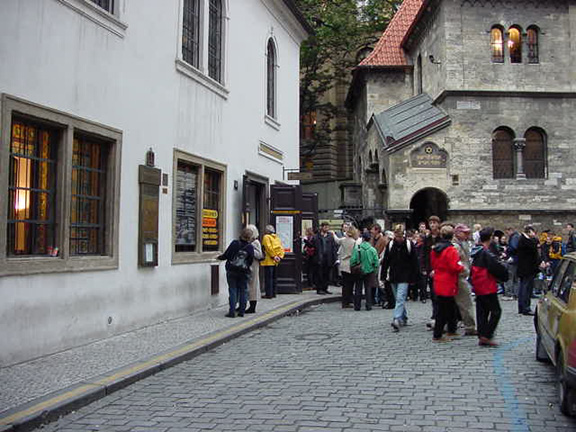The Klausen Synagogue
 Klausen Synagogue on
the left, Ceremonial Hall in the background
Klausen Synagogue on
the left, Ceremonial Hall in the background
West of the Old-New Synagogue and the
Town Hall, which are side by side on Maiselova Street, a narrow
street lined with souvenir stands leads you to the Ceremonial
Hall at the end of the street, and to the left, the Klausen Synagogue.
This synagogue with its very plain exterior was founded by Mordechai
Maisel, who also founded the Maisel Synagogue on Maiselova Street
and the Old Town Hall.
Behind the Klausen Synagogue is the Old
Jewish Cemetery and the exit from the cemetery is right by the
entrance to the Klausen Synagogue. Note the blue line on the
street which designates the parking area. Believe it or not,
some of the narrow streets in the old Jewish quarter were open
to vehicular traffic in 2000, and the pedestrians who walk in
the middle of the street had to scatter when a driver honked
his horn.
Prague is in Bohemia, a state that was
for centuries a part of the Holy Roman Empire, ruled by German
kings. Consequently, about half of the Jews who formerly lived
in the old Jewish quarter of Prague were German or Yiddish speakers.
This explains why the Klausen Synagogue acquired a German name.
The word Klaus means "small building"
in German. The word was derived from the Latin word claustrum.
The synagogue got its name because it was originally three small
buildings (Klausen is the plural of Klaus) which were built by
Mordechai Maisel, the head of the Prague Jewish Community, in
honor of a visit by Emperor Maximilian II in 1573. Maximilian
II was the Emperor of the Holy Roman Empire of the German Nation.
A fire in the ghetto in 1689 resulted
in the destruction of the original three buildings. The present
building was completed in 1694, but it was remodeled in the 1880s.
The Klausen Synagogue is the largest
of the six synagogues in the Jewish ghetto and it was the home
of the Jewish Burial Society in Prague. The building is connected
to the wall around the Old Jewish Cemetery. Along the cemetery
wall, a few feet from the synagogue, there is a line of vendor
stalls, selling Jewish souvenirs to the mostly non-Jewish tourists.
The permanent exhibit in the Klausen
Synagogue is entitled "Jewish Customs and Traditions."
Here you will find exhibits about every-day life in the Jewish
community and customs connected with birth, circumcision, bar
mitzvahs, weddings, divorce and the Jewish household. The second
half of this exhibit is located in the Ceremonial Hall, next
door to the Klausen Synagogue.
|